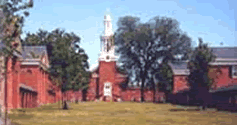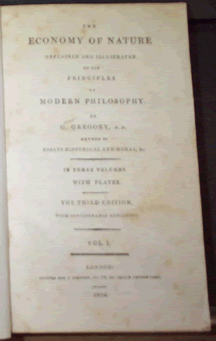 |
Divinity
Library |
| Sterling Memorial |
| Manuscripts & Archives |
| Music |
| Divinity |
| Forestry |
| Kline Sciences |
| Medical Historical |
| Exhibit Map |
|
Case 1 George Gregory, The Economy of Nature: Explained and Illustrated on the Principles of Modern Philosophy (London: J. Johnson, 1804). In the tradition of natural theology, George Gregory devoted three volumes to a comprehensive survey of knowledge of the natural world. Like Paley's work this was meant to be a program of study of God's creation that spanned the chemistry of plant respiration to human morality. In volume three, he draws on the work of Erasmus Darwin (Charles Darwin's grandfather and a renowned botanist) and the chemists Joseph Priestly and Lavoisier to describe the interconnected respiratory processes of plants and animals. When writing of 'putrid putrefaction", Gregory explained that it destroys the equilibrium which holds the constituent principles of bodies in a state of combination. It reduces organic beings into their constituent parts. If God is evident in the immense bodies of operations of the celestial sphere, then "surely it is much more so in these minute operations which are the immediate objects of our senses, where everything is plainly the effect of intelligence and design; and, however ignorant and superficial observers may wander from the path of truth, the naturalist at least can never be an atheist." (p. 77) |
 |
Whitney Humanities Center
Yale University
53 Wall Street
P.O. Box 208298
New Haven, CT 06520-8298
Office: (203).432.3112
lloydackert@sbcglobal.net
The exhibit is located in three cases in the rotunda on the first floor of the Divinity Library. The library is at:
409 Prospect Street
New Haven, CT 06511
Phone: (203) 432-5290
Circulation
Email: Divlib.Circdesk@Yale.edu
Reference Email:
Divinity.Library@Yale.edu